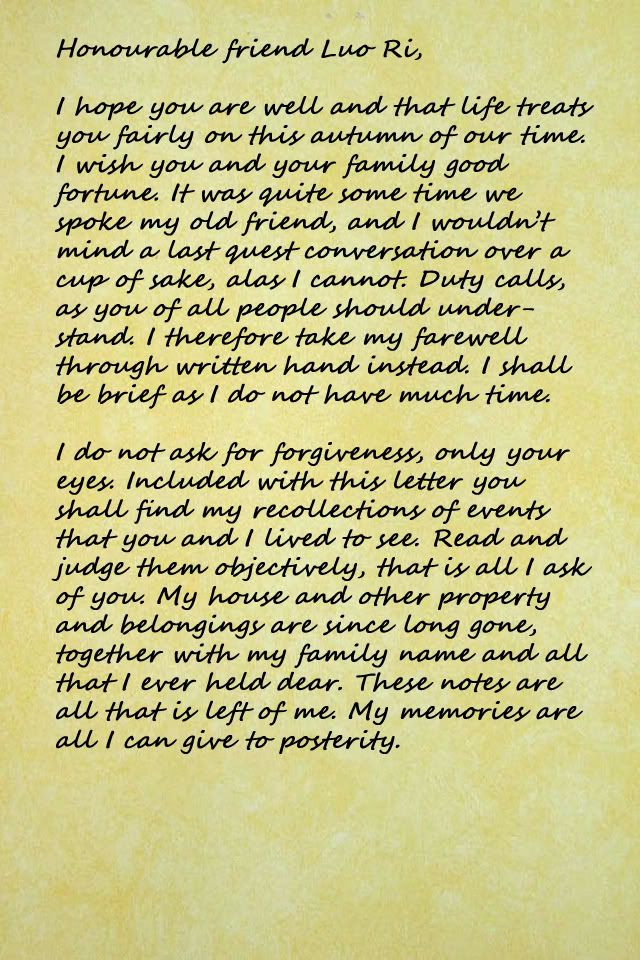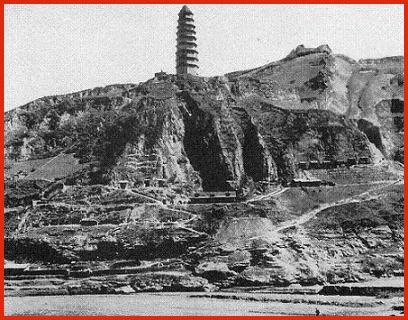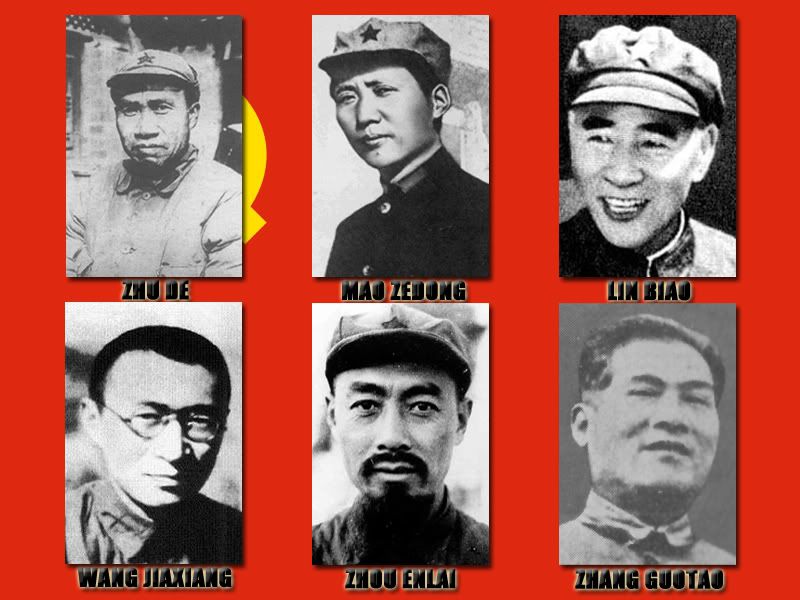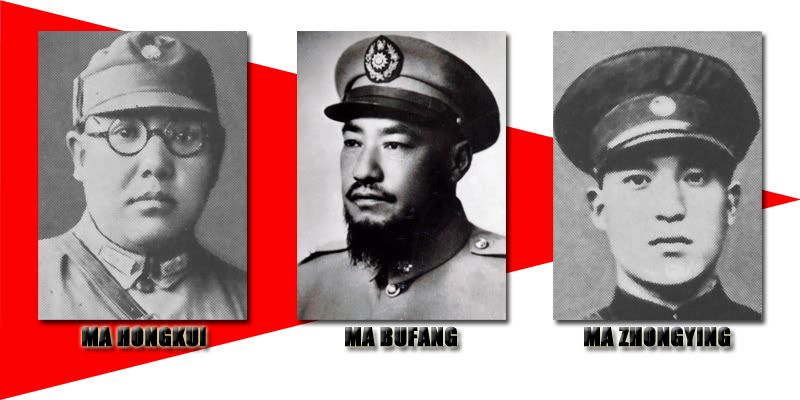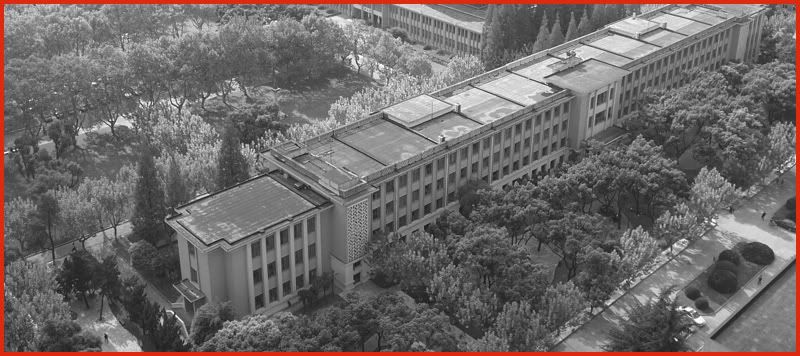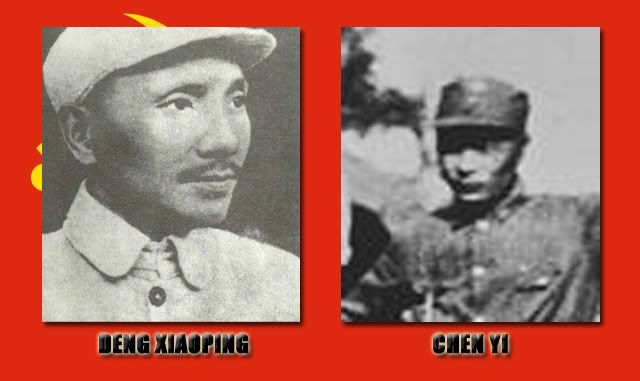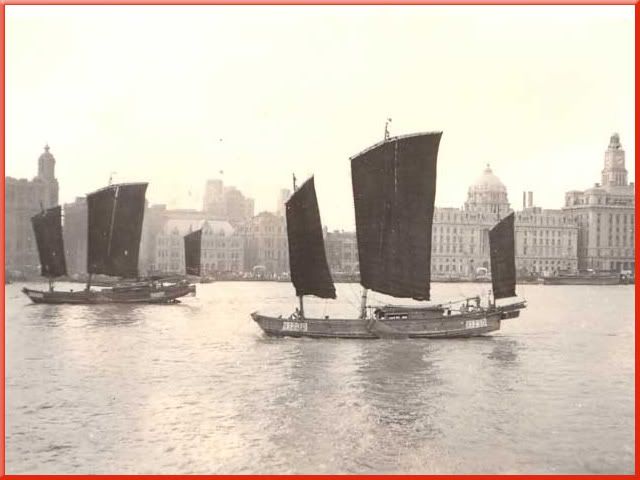The Typhoons of War
Chapter Six
SHANGHAI
January 11, 12.01 p.m.
It was a bright, sunny Saturday when Luo Chen and Doctor Ōgawa Kenji met up at
Le Riche, a reputed French restaurant close to the harbour promenade, to meet over lunch. Chen had as requested by the visitor contacted him about meeting up since they had had precious little time to discuss obvious common topics of interest the last time. Chen had put on his best set of pants and a thick, milk-white sweater to keep him warm since the sun unfortunately did little to keep the chilly wind at bay. Ōgawa was dressed in less formal, grey tweeds this day, but he still looked very proper with watch in one of the pockets and a matching bowler hat in his hand.
‘Young Luo, there you are,’ he began as they ran into each other just outside the restaurant. ‘Good that you made it.’
Chen bowed politely. ‘The pleasure is mine, Doctor.’
‘Well, shall we?’ Ōgawa continued, and gestured for the interior.
They headed inside and waited a quarter of an hour for a table as the restaurant staff was immensely busy during lunch time.
‘Perhaps we should’ve come during another time,’ Ōgawa stated, concerned about the waiting. ‘Seeing it’s your day off and all we could’ve gone at any time, really.’
‘It’s perfectly alright, Doctor. And to be honest I only have a few hours today. With finals coming up soon, Ping and I have study sessions together every weekend. I only have until around 4 p.m. today, I’m afraid. Very sorry.’
‘Should be more than enough time for us then,’ Ōgawa replied confidently.
Once they got a table they ordered the restaurant’s recommended dish and immediately got to talking. Chen had much to ask of the supposedly best friend of his father, while Ōgawa in turn had plenty to inquire about as well, but he let the young man start.
‘There’s so much I’d like to talk to you about Doctor, I’ve been thinking ever since the lecture about the coincidence that we should have met. It seems quite unreal, and yet here we are. My father’s been talking so much about you but never really what you did outside of school, how did you meet in the first place for example?’
‘It was quite the stroke of luck actually!’ Ōgawa said. ‘You see, when I came to China as a young man back in 1914, tuition fees paid by my father for Tongji, I ironically could not speak Chinese. How about that.’ He smiled briefly at the thought. ‘Study at a Chinese university without knowing the language.’
He took a sip of the coffee they had been served.
‘I did have a brand new Japanese-Chinese dictionary with me, mind you, but since it was a medical school my German would of course guide me through the courses, but when I had barely arrived there I really was a bit lost. Chinese all over, and while I could make out road signs so-so, I had no idea how to read addresses. But as a stubborn, adolescent boy on his way to become a man I refused to acknowledge that and was determined I could do it on my own. Bags in hand I wandered straight from the docks to the university area, which I luckily knew where it was from beforehand.’
‘So you were lodged at the university campus then?’ Chen asked.
‘No not really, that was the problem,’ Ōgawa said chuckling. ‘I had no idea where my apartment was! It had kindly been arranged by the university, and the address had been handed to me. So, setting off to the university I was hoping I could get some help from the administration without losing face too badly. Now, this is where your father comes in. I’m not sure to this day if I was giving broadcasting that I was foreign and lost, but once at the university campus looking over the map there he was, looking at me as if knowing at an instant I needed help. At first he tried his way in Chinese but when he figured I didn’t know any he switched to German. At that moment I knew I was saved. I wouldn’t have to embarrass myself in front of the university, and we immediately started talking about my apartment. As it turned out, your father lived in the very same building as I! How about that.’
Chen smiled amused at the story adding, ‘And now years later you’ve met his son at the very same university.’
Ōgawa laughed, ‘Precisely! It’s almost like fate.’
‘But not knowing any Chinese, how come you spoke to me in Mandarin after the lecture? Did you study Chinese after arriving?’
Ōgawa nodded. ‘More or less. It was actually your father that made me learn some of the local tongue, as it undoubtedly made it easier to live. I don’t think I would’ve prospered very well outside the university and its German unless I had picked up Chinese. The fact however, is that your father, brilliant as he was, started learning Japanese, and faster than I did Chinese mind you! It was not long until we could have simple but fruitful conversations in Japanese, and sometimes even in Chinese. It was a very fulfilling time in my youth. Upperclassman Luo proved to be a good and helpful friend.’
‘I’m sorry Doctor, I don’t mean to be rude,’ Chen said, meaning it, ‘but when you say upperclassman, how much younger does that make you compared to my father?’
‘None taken my boy. Your father was two years ahead of me. I remember it clear as day because just a few months after our meeting up he was celebrating his 19th birthday at which time I was seventeen. Since he was ahead of me I could always ask him about problems I didn’t understand. Beyond a friend he was a good tutor. Very sharp mind.’
‘So,’ Ōgawa continued to not lose the momentum, ‘your father is working abroad now you say?’
Chen swallowed unnoticeably to clear away any nervousness.
‘Yes, that’s correct,’ he began, always unsure about this particular sort of situation. He hoped the food would arrive soon.
‘Well,’ Ōgawa said, leaning forward slightly. Chen figured this man would unfortunately be more persistent and thorough compared to people previously asking about his father, being a close friend from university after all. He had to lie good this time.
‘He’s in Portugal.’ Chen tried to remember the name of the capital. ‘Lisbon! Actually.’
Ōgawa was clearly taken aback by the news looking at his reaction. He was almost stupefied and Chen thought he was safe for another while, which would give him time to work on the story.
‘How about that! Lisbon. I’d never have imagined. How did he come to possess a job over there?’
‘Research,’ Chen corrected him, remembering what he had told the doctor before. ‘He was not too clear on the details before he left, but it had to do with the Spanish flu.’
Chen wondered if his face was red because he started feeling extremely hot and it only got worse for him through the entire lunch as he continued to elaborate on his father’s duties in far-away Portugal. He tried to be as vague as possible about everything while still keeping up certain details that could form a red thread which connected and supported his claims. When the dishes had been cleared away by the waiters and they were waiting for a light desert of cheese and locally produced wine fit for a French restaurant Chen felt the need to change the topic, else he would say something that finally contradicted what he had said before.
‘Well Doctor, I really hope that clears some of the questions you’ve had about my father.’
Ōgawa nodded somewhat distracted, as if still thinking to himself about what had been said, trying to figure out what it all meant. Thinking quickly about a new subject Chen decided to be bold, never really having been given the opportunity to talk to a Japanese about it. He started off politely as usual.
‘I’ve been thinking Doctor, I was really hoping I could ask you some questions concerning an issue that is being discussed widely at the university, by virtually anyone, not just the medical students.’
Coming back from his thought process seemingly ready to face a new topic Ōgawa nodded acknowledging but said nothing, reaching for his third cup of coffee instead.
‘It is a matter of both Japan and China, I believe,’ Chen said, trying to feel Ōgawa. When no reaction came he continued.
‘I’m not sure about the final details, no one at the university does I believe, but I thought that as a native you might have some more insight about the Japanese plans for…,’ Chen sought for the expression in German. ‘…a Greater East Asian Co-prosperity Sphere.’
‘Ah!’ Ōgawa finally reacted and put down his coffee.
‘Yes, yes, where have you picked that expression up? I didn’t know it was well known outside of Japan.’
‘I’ve only heard it at university, but perhaps compared to your times we don’t really have many Japanese students at Tongji. I couldn’t say for sure, but I for one have never met a single Japanese.’
‘They sure are missing out on something, my fellow countrymen,’ Ōgawa said before returning to the topic. ‘I don’t think I mentioned it before, but the fact is I work for the government. I am not just any doctor, I work for a man called Okada Keisuke, perhaps you’ve heard of him?’
Chen thought hard but shook his head.
‘I might have heard the name but I can’t recall. I’m sorry to say I’m usually good with anything but names.’
‘He just happens to be the Prime Minister of Japan, but beyond that he is also admiral in the navy. I in turn am working as his aide as a medical officer in his staff. Just like Luo, I have been quite fortunate in my life after Tongji. But I’m digressing. Of what exactly were you curious concerning the Co-prosperity Sphere?’
‘Then you must be the best person to talk to about this I could ever meet!’ Chen exclaimed, not really believing his luck. ‘I hope I won’t offend you with any of my questions.’
Ōgawa made an inviting gesture with his hand. ‘I shall endeavour to answer your questions objectively without taking offense, that I promise. Go ahead young man.’
‘Very well, I know that there are talks about the Co-prosperity Sphere where all of Asia will benefit from a joint effort to secure the land for Asians, and that Japan seems to wish to lead this order together with other Asian countries. But from my point of view right now Japan isn’t doing exactly that, more like disrupting the stability of China.’
Ōgawa seemed sceptical of Chen’s suggestion, but kept quiet.
‘The Republic is trying to establish its supremacy over the local warlords in order to unite China, but this is being made impossible by Japan’s entry into Manchuria, wouldn’t you agree Doctor?’
The older man seemed to let go of his previous disposition and think carefully about what Chen had said.
‘With a Japanese-sanctioned government that is ruled by one of these warlords it even further complicates things when the Chinese government is trying to control the rebellious factions across the country. And it doesn’t help that there is a Japanese corridor between government troops and the northern warlord in question.’
‘By corridor you mean the Japanese-controlled land by Kiautschou Bay?’
Chen nodded, ‘Yes, exactly. Land that should be in the hands of the Chinese. If Japan wants to hold on to it, and also support the warlord militarily and economically, how can we ever achieve this Co-prosperity Sphere together?’
‘Lands formally conceded to the Japanese government after the Great war, though,’ Ōgawa said. It almost felt like speaking to old Luo again, he thought. An impressive feat, well pulled off by the man’s son. Deep inside him it pleased him greatly.
‘By a treaty that was not recognised by our government, beyond the fact that it was Chinese lands before even being leased to the Germans who then lost it to Japanese occupiers. I’m really sorry Doctor, but this is an important issue to us Chinese, especially students. We who are educating ourselves for a future in China are quite conscious of issues such as this,’ Chen continued, clearly burning for discussion of the topic.
Ōgawa nodded friskily, positively astounded at the young man’s profound knowledge, before answering.
‘Chen my boy, I understand why you take this to heart and just to clarify things, know that I do agree with you. I’d have you know that Mr Okada is working ever so diligently for peace, I of all people should know. Moderate forces in the Japanese government are what will pull our nation through the hardships of today, what with the lousy economy at the moment. Here is what I believe; a true Co-prosperity Sphere is definitely viable, where we can wrestle control of Asia from the Europeans and Americans to make our own destiny while at the same time retaining good trade relations with mentioned countries. At the same time Asian countries will be able to recognise and support each other to maintain legitimate governments while solving current disputes. This way we can restore the economic situation to everyone’s benefit.’
Chen bowed to his father’s friend in earnest gratitude.
‘Thank you Doctor, it feels very good to hear you say that, considering your position. I understand this might not be the official standpoint today but I hope that the rest of the Japanese will be as wise as you. Would it be possible for me to discuss with my friends at university what I have heard from you today?’
‘I wouldn’t mind at all, son. Frankly I am quite happy to see you involved to this degree. I know that your father was interested in the same thing. His interest must have passed on to you, I’d say.’
Chen took the last of the cheese on his plate and pondered while slowly chewing it before speaking up again.
‘So, having said that, you sincerely believe that there won’t be any sort of disputes with Japan as aggressor? What I mean is,’ Chen said, explaining himself before being prematurely misunderstood, ‘some of my university friends claim that Japan might actually be ready to increase its military presence both at land and at sea. I’m not saying it’s projected at China solely, but some of my friends are questioning what your government wishes to gain by it.’
Ōgawa took on a very grave and serious look. He knew exactly what Chen’s concerns were about. Less than two years ago Japan had broken its naval treaty with England and the United States which limited the navy, and was now modernising and expanding heavily. Ōgawa knew those signs could not bode well for anyone. His superior Okada had been a firm opponent of the dissolution of the treaty, but his faction had been the losing side, and although he wished it not so, Ōgawa knew that nationalism to an extreme degree was growing as a cancer in his country. He prayed to the Buddha that the Prime Minister could turn the unfortunate events around before being voted out of office. To Chen he tried to keep up his appearance by quickly putting on an unconcerned expression.
‘You will see that everything happening is for a good reason. You can safely tell your friends that Japan has no intention of acting aggressively against any country in Asia, else as you say, the Co-prosperity Sphere would be a fiasco. Rest assured young Luo that Japan takes care of its neighbours.’
‘Thank you again Doctor. It is truly well to hear such news in these times when one only hears of dissent and tragedy. This warlord business is quite straining.’
Ōgawa nodded understandingly.
‘Yes I can imagine. Alas I feel bad about telling you about my next destination.’
‘Guangxi University right?’ Chen interjected. ‘Yes I believe you mentioned it after the lecture. I didn’t mean it like that though, Doctor. I don’t have anything against the people in Guangxi, it’s the policies that keep us divided that make us students protest. I wouldn’t be surprised if they thought the same, really.’
‘I am of the very same opinion son,’ Ōgawa replied as he called for the check, and to signal its ending he added, ‘Well it’s been a wonderful lunch.’
‘The pleasure was all mine,’ Chen added hurriedly, meaning it.
‘It was really delightful to chat, Chen. It reminded me of my time with your father, in more than one way. Very enjoyable. Actually there is a thing I’d like to ask of you, if it’s not too much trouble.’
Chen shook his head, not sensing the trap he had laid for himself.
‘Being in Lisbon it might be a long-shot, but I’d very much like to get in contact with your father.’
Chen cursed himself in his mind as Ōgawa pulled forth pen and paper, the same used as before.
‘Would it be possible for me to get his address, or at the least your family address in China so that I could write him? Naturally I’ll give my address in Japan as well so he can reply at his earliest convenience.’
Chen tried to make the best out of the situation by smiling as he wrote down his family address in Nanchang, Jiangxi province.
‘It’ll be better if we send any of your letter with our own batches, then we can be certain the address is correct, I really can’t recall the exact one at the moment. Portuguese street names and such, I’m sure you understand.’
‘Certainly,’ Ōgawa replied seemingly oblivious, before writing his own address in Japan. ‘Perhaps I’ll write him in Japanese, see if he remembers any of it,’ he added chuckling.
As they both got up with exchanged addresses Chen felt honoured to shake the doctor’s hand. ‘It’s been a true pleasure, Doctor. I understand why my father appreciated your company, sir.’
‘Don’t mention it my boy, any friend of Luo’s is mine, and more so his son!’ Ōgawa said, flattered and pleased. ‘Be sure to study hard now, don’t want to let your father down now would we.’
‘I will, Doctor. You have my word on that.’




